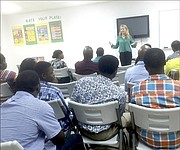By ETHAN KNOWLES
SCIENTISTS estimate that every square mile of ocean contains about 46,000 pieces of floating plastic. As an archipelagic nation situated within 90,000 square miles of water, The Bahamas should be particularly concerned about this debris statistic from the Pacific Regional Environment Programme. When calculated, that’s 4.14 billion pieces of plastic in our waters.
Think of the impact. Aquatic species die by ingesting drifting plastic, tourists are discouraged from swimming in our seemingly “polluted” waters and our beaches develop an overlying layer of non-biodegradable refuse. Undesirable would be a burning understatement.
So, in an effort to reduce the adverse impact of this ubiquitous solid waste, the Diabetic Research Institute (DRI) focused its twelfth annual summer internship programme around the natural environment.
For the second year in a row, Bianca Wagner spearheaded the initiative that, she said, addressed the “drastic issues we’re facing environmentally” while teaching participants the value of teamwork and professionalism.
This year’s programme, which finished on Friday, ran under the theme “Youth for a Brighter Bahamas” and saw applicants aged from 16 to 19. The four-week scheme began with informative workshops on the issues of global warming, rising sea levels and pollution. Interns were charged with the task of designing a campaign to discourage profuse use of plastic bags and then present an inventive solution of their own.
Between ecocentric presentations at the Nazareth Centre and field trips around New Providence, participants were kept busy as they developed the interpersonal and problem-solving skills often overlooked in traditional education.
Through corporate collaboration with likes of Solomon’s, Cost Right and Renew Bahamas, the DRI interns raised public awareness about environmental concerns during weekend drives. This culminated into one main undertaking: a t-shirt bag drive.
The infamous t-shirt bag is an innovative and environmentally conscious alternative to the plastic bag. By cutting off the sleeves from an old shirt, tying up the bottom and widening the neck hole, participants were able to fashion over 200 of these effective tools that could eventually help limit the environmental impact of the traditional tote.
Ms Wagner told The Tribune that the “very strong group this year” was “genuinely engaged in this initiative” and added that the programme is helpful by extension as “it gives young Bahamians the opportunity to investigate how their actions affect a) their environment and b) themselves”.
The DRI is a privately funded, not-for-profit charity that aims to conduct research on diabetes, a lifelong condition affecting many Bahamians. The institution on Montrose Avenue provides free diabetic support in the form of education and supplies from qualified doctors; and the facility is open from Wednesday to Saturday from noon to 7pm. Besides offering a communal environment for diabetics, the DRI also conducts a kids club for young patients to help them overcome various obstacles they may face in their daily lives. For further information, contact 326-5134.




Comments
Use the comment form below to begin a discussion about this content.
Sign in to comment
Or login with:
OpenID